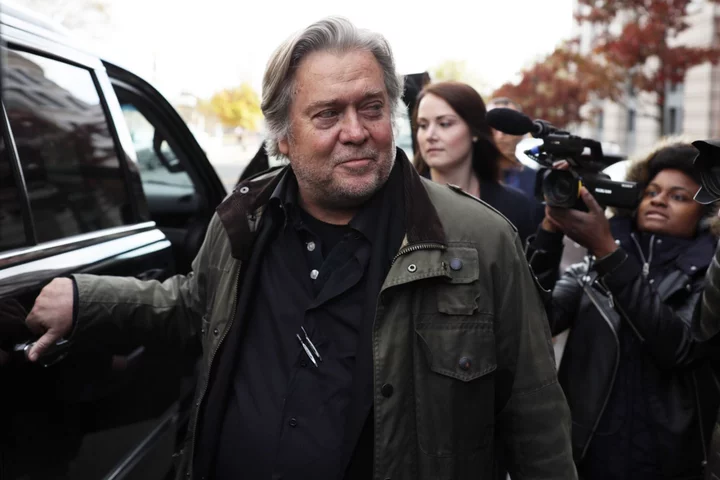An attorney for Steve Bannon pressed an appellate panel to overturn a contempt of Congress conviction for the longtime adviser to former President Donald Trump.
A jury last year found Bannon guilty of two counts for refusing to testify and hand over documents to the congressional committee investigating the US Capitol riot on Jan. 6, 2021.
David Schoen, Bannon’s attorney, argued that his client’s constitutional rights were infringed since US District Judge Carl Nichols prohibited him from explaining to a jury why he didn’t respond to the subpoena. Defense counsel have said that Bannon, in refusing to cooperate with the committee, relied on advice from his then-attorney Robert Costello that he was bound by executive privilege and on previous Justice Department opinions that shielded presidential advisers.
Nichols cited a long-standing court decision called Licavoli in barring Bannon from putting on an “advice of counsel” defense, ruling that he could present evidence that showed he unintentionally failed to respond to the subpoena. But after the conviction, Nichols stated that Bannon’s appeal “raises a substantial question of law that is likely to result in a reversal or an order for a new trial.”
“Mr. Bannon knows only what Mr. Costello told him,” said Schoen on Thursday before a three-judge panel in the DC Circuit Court of Appeals. “He did what a lay person should do. He hired a lawyer,” he said during arguments.
DC Circuit Judge Bradley Garcia, an appointee of President Joe Biden, asked Schoen why the panel’s hands wouldn’t be tied by the Licavoli decision. Schoen brought up a separate court decision that he believed would let his client use an advice of counsel defense.
Garcia also asked Schoen how he could reconcile Bannon’s claim of complete immunity with a letter Trump attorney Justin Clark sent to Costello raising doubts that his client would be protected.
Another member of the appellate panel, DC Circuit Judge Cornelia Pillard, who was appointed by Barack Obama, questioned whether Bannon’s communications would have been protected by executive privilege anyway since he wasn’t in the White House at the time and only a few documents pertained to correspondence with Trump.
DC Circuit Judge Justin Walker, who was appointed by Trump, asked Schoen how he could be sure that the information sought by the committee would have been protected by executive privilege.
Advice of Counsel
“I don’t know what the committee would have asked,” said Schoen. “The advice might not have been correct that Bannon got.”
Prosecutors have accused Bannon of trying to act above the law in declining to respond to the subpoena. The government also argued that Trump never invoked executive privilege and that much of the information sought by the committee wouldn’t have been covered by that protection.
“Stephen Bannon decisively chose not to comply with a Congressional subpoena,” argued prosecutor Elizabeth Danello. Danello said that past court decisions show that “good faith as well as advice of counsel is not a defense.”
Walker also asked Danello whether it was “appropriate” that the prosecutor told the jury during the trial that Bannon had no justification for failing to respond to the subpoena when the judge had prohibited the defendant from providing a reason. Danello said that the prosecutor made a legally correct statement, noting that “Bannon had a choice. He was aware of the risk. He took it and was properly prosecuted.”
Bannon became one of the only participants in Trump’s inner circle to be tried for refusing to cooperate with the House Jan. 6 committee. In September, former White House trade adviser Peter Navarro was also convicted of the same charges. Nichols sentenced Bannon to spend four months in jail and pay a $6,500 fine. He ordered that the sentence be stayed while Bannon appealed.
Bannon’s lawyers also argued that Nichols made a mistake in quashing subpoenas for committee members to testify at trial. The judge earlier ruled that most of the testimony sought was barred by the “speech and debate” clause of the US Constitution, which prohibits questioning members of Congress in court about their legislative work.

